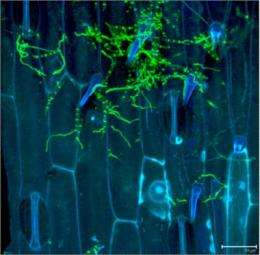Rot-resistant wheat could save farmers millions

(PhysOrg.com) -- CSIRO researchers have identified wheat and barley lines resistant to Crown Rot - a disease that costs Australian wheat and barley farmers $79 million in lost yield every year.
Crown Rot, which is a chronic problem throughout the Australian wheat belt, is caused by the fungus Fusarium.
Dr Chunji Liu and his CSIRO Plant Industry team in Brisbane are using sophisticated screening methods to scan over 2400 wheat lines and 1000 barley lines from around the world to find the ones resistant the fungal disease.
"The wheat and barley lines showing resistance to Crown Rot are now being used in pre-breeding programs to incorporate the resistance into adapted varieties for delivery to the wheat breeding companies," Dr Liu says.
Crown Rot infects many grasses and weeds found in wheat growing regions and minimum till cropping encourages Fusarium which survives in cereal stubbles.

Minimum till cropping minimises soil disturbance and retains plant stubble from previous crops in order to promote soil health and limit erosion.
Developing Crown Rot resistant wheat and barley varieties is an essential strategy in fighting the disease.
"As well as developing Crown Rot resistant varieties, we are also studying how Fusarium invades the plant, how plants resist Fusarium infection and what genes may be involved in defending the plant against Fusarium or reducing its effect on yield," Dr Liu says.
Another of the most serious wheat diseases in Australia, Head Blight, is also caused by Fusarium.
Source: CSIRO Australia

















